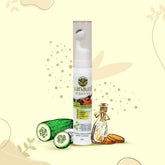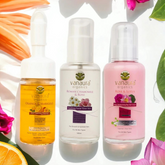Is overwashing your face bad? Washing tips for your skin
Overwashing your face can be bad for your skin. When you wash your face too frequently, it can strip the skin's natural oils and moisture, leading to dryness, irritation, and potentially even acne.
It is recommended to wash your face no more than twice a day, once in the morning and once at night before bed. If you have oily skin or if you are active and sweating excessively, you may need to wash your face more frequently, but it is still important to use a gentle cleanser and not overdo it. You can follow up with a moisturiser to help replenish the skin's natural oils and moisture.
What Does Overwashing Your Face Do?
- Overwashing your face can strip the skin's natural oils, leading to dryness, irritation, and potentially even acne.
- It can also disrupt the skin's natural pH balance, leading to sensitivity and discomfort.
- Overwashing can lead to the overuse of products, which can further irritate the skin.
Therefore, it is essential to find a balance in cleansing the skin, as too little cleansing can lead to the build-up of dirt and oil, while too much can harm the skin's natural barrier.
Removes the Natural Oils
The natural oils, also known as sebum, are produced by the sebaceous glands and are essential for maintaining the skin's moisture balance and protecting the skin from external irritants. However, when the skin is washed too frequently or with harsh cleansers, it can strip the skin of these natural oils, leading to dryness, irritation, and an increased risk of acne and other skin conditions.
It affects skin microbes and the immune response.
Overwashing can disrupt the delicate balance of microbes on the skin, leading to an imbalance of beneficial and harmful microbes. This can lead to dryness, irritation, and inflammation, weakening the skin's immune response.
It affects the pH balance of the skin.
The natural pH balance of healthy skin is around 5.5, which is slightly acidic. It helps to protect the skin from bacteria and other harmful substances. Overwashing can strip the skin of its natural oils and disrupt this pH balance, causing the skin to become too alkaline or acidic. This can lead to dryness, irritation, and an increased risk of infection.
How often should you wash your face?
- It is generally recommended to wash your face two times a day, once in the morning and once before bedtime.
- However, you may need to wash your face more frequently if you have oily or acne-prone skin.
- It is also important to clean your face after sweating or coming into contact with dirt or pollution.
- Always use a gentle cleanser and avoid harsh scrubbing or over-washing, as this can strip natural oils from the skin and cause irritation.
- It is also important to moisturise your skin after washing to keep it hydrated and healthy.
Washing tips for acne-prone, oily skin:
- Use a gentle, oil-free cleanser: Look for a cleanser specifically formulated for acne-prone and oily skin. Avoid cleansers that contain harsh ingredients or oils, as these can clog pores and exacerbate acne.
- Wash your face twice a day: It is important to cleanse your face in the morning and at night to remove excess oil and dirt that can lead to acne breakouts.
- Avoid hot water: Hot water can strip your skin of its natural oils, leading to more oil production and acne. Instead, use lukewarm water to cleanse your face.
- Use a toner: After cleansing, use a toner to remove any remaining dirt and oil from your pores. Look for a toner that is alcohol-free and formulated for oily skin.
- Exfoliate once or twice a week: Exfoliating helps remove dead skin cells and unclog pores, preventing acne. However, be sure to use a gentle exfoliator and avoid over-exfoliating, as this can irritate and dry your skin.
- Avoid touching your face: Keep your hands off your face as much as possible to avoid transferring bacteria and oil from your hands to your skin.
- Use non-comedogenic makeup: Look for products labelled as non-comedogenic, which are less likely to clog pores and cause acne.
- Remove makeup before bed: Be sure to remove all makeup before bed to allow your skin to breathe and prevent breakouts.
Washing tips for dry and sensitive skin:
- Use lukewarm water instead of hot water. Hot water can strip the natural oils off your skin and cause dryness.
- Use a gentle, sulphate-free cleanser. Sulphates can be harsh and dry on the skin.
- Avoid using a washcloth or scrubbing the skin. This can cause irritation and dryness.
- Pat the skin dry instead of rubbing it with a towel. Rubbing can irritate and lead to dryness.
- Moisturise immediately after washing the skin. This will help lock in moisture and prevent dryness.
- Avoid using alcohol-based toners or astringents, as they can dry the skin.
- Consider using a humidifier in your home, especially when the air is dry in winter. This can help add moisture to the air and keep your skin hydrated.
- Drink plenty of water to stay hydrated and help keep your skin moisturised from the inside out.
- Use a facial mask once a week to nourish and hydrate the skin. Look for ones that contain ingredients like hyaluronic acid, ceramides, and aloe vera.
- Avoid using products that contain fragrances or other harsh chemicals, as they can be irritating to sensitive skin.
Choose the right cleanser for your skin
Dry and sensitive skin
A gentle, non-foaming cleanser is suitable for dry and sensitive skin. Look for ingredients like glycerin, aloe vera, and hyaluronic acid, which help to moisturise and soothe the skin. Avoid cleansers with alcohol, fragrances, and sulphates, which can dry and irritate sensitive skin.
Acne-prone and oily skin
A cleanser suitable for acne-prone and oily skin is typically a foaming or gel cleanser formulated with salicylic acid or benzoyl peroxide. These ingredients can unclog pores and reduce excess oil production, which can help to prevent acne breakouts. It's crucial to choose a cleanser that is non-comedogenic, meaning it won't clog pores and is gentle and non-irritating. Other ingredients that may be beneficial for acne-prone and oily skin include tea tree oil, aloe vera, and chamomile.
Try our Mild foaming face cleanser enriched with Orange and marigold extracts. Our mild cleanser, made with natural ingredients, is best suited for acne-prone, oily skin.







